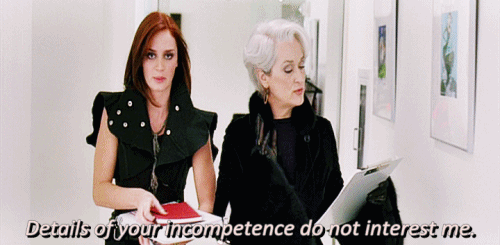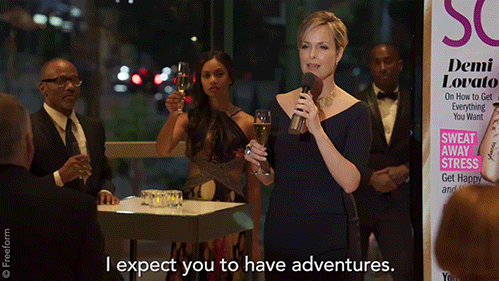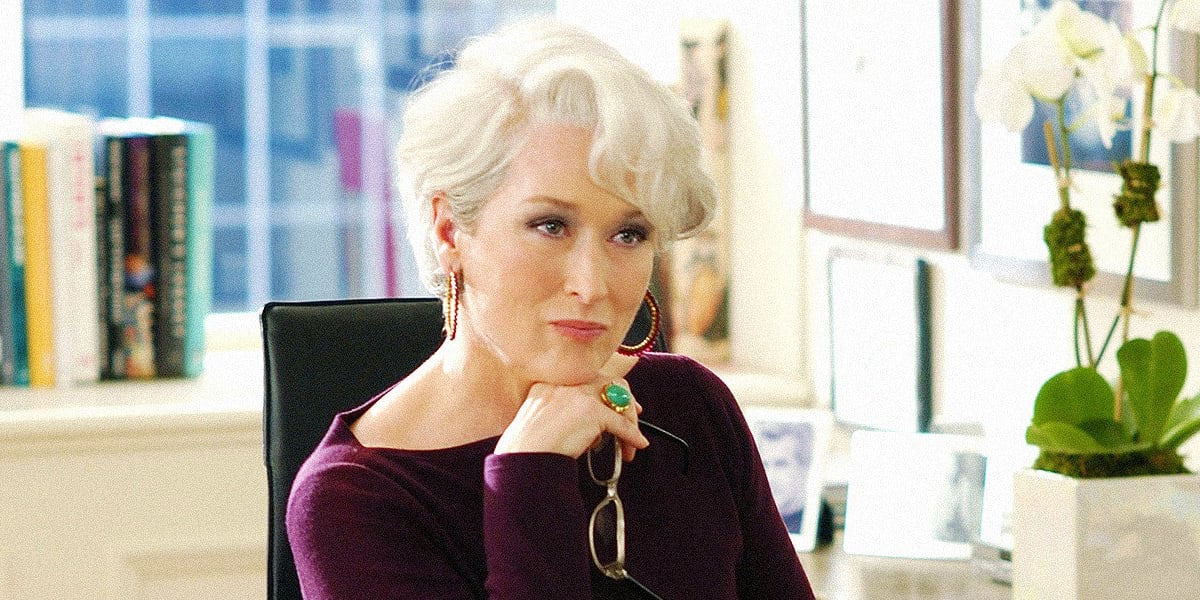Everyone’s had one. The boss straight from hell, who unleashes torments onto their poor, defenseless staff. Be it that manager at the restaurant you worked at for your first job, or the high-powered executive with the ego to match, it’s a fairly universal experience. And as with all universal experiences, Hollywood has drawn inspiration from it to set the backdrop for many a film and television show.
The most iconic boss might be Meryl Streep’s memorable and meme-able Miranda Priestly from 2006’s The Devil Wears Prada, a dramedy that earned her yet another Oscar nomination. Miranda is cold, demanding, and every inch the tormentor of Anne Hathaway’s Andy Sachs, the put-upon assistant who’s struggling to survive a year at fashion magazine she doesn’t care about.
Miranda is supposed to be an antagonist, but it’s hard not to root for Streep’s powerhouse of an editor. Especially when one considers how Andy constantly whines at work and complains about how hard it is while also climbing the ladder at Runway. It’s one thing to complain about work; if we didn’t vent about hard things, our heads might actually explode. It’s science. But Andy’s character is entirely based around complaining. We never see a more ambitious side, or a side that’s willing to put more work in to succeed with a difficult boss. All she does is what she’s told and then goes on to weep about her life.

For a while, it seemed as though Miranda-type characters would be the only depiction of tough female bosses in media, especially when it comes to women (think of Sandra Bullock’s defrosting ice queen in The Proposal or Jennifer Aniston’s sexual harasser in Horrible Bosses). But once we hit the late 2010’s, bosses began to change for the better, and the tough-as-nails women began to have more nuance and empathy.
Take Cat Grant (Calista Flockhart) in Supergirl, who started off as a Miranda-esque figure but proved to deeply care for Kara (Melissa Benoist) and took no guff from anyone. She was a powerhouse figure who didn’t shy away from being demanding or a boss, but who also didn’t allow anyone to disrespect her employees. Cat’s role in the show was to be Kara’s human mentor, to help her grow into a strong woman without the cape. Sadly, she has left the series, which means the show lost a strong mentor-mentoree relationship between two women, which is rare in media.
Next up is Jacqueline Carlyle (Melora Hardin), the editor in chief of Scarlet magazine on The Bold Type. She mentors the three young leads but namely Jane (Katie Stevens), a recently promoted writer. She’s never presented as soft or motherly, but a shrewd woman who expects her staff to be on their best at all times. However, this is never shown as being something that’s an antagonistic trait but something that Jane strives to live up to. She doesn’t want to disappoint her boss, but not out of fear but rather respect. Again, it’s a healthy mentor-mentoree relationship between two women that isn’t based on cattiness or on conflict.

Finally, there’s the latest addition to the line-up with Set It Up, the definitely Miranda-inspired Kirsten (Lucy Liu), who works herself and her assistant Harper (Zoey Deutch) so hard that Harper turns to fellow over-worked assistant Charlie (Glen Powell) to help her pair Kirsten off with his boss Rick (Taye Diggs).
It’s Parent Trap meets Prada, except that Kirsten benefits from nuance given to her by the script. She admits she works Harper so hard so that she’ll be ready for a tough industry, and respects her input. In the end, she agrees to help her with her articles and shows a real respect for all that Harper has done for her without being apologetic for being tough.
Slowly but surely, tough lady bosses are making their way into the mainstream without being the villains or needing to be toned down. If fictional male bosses can be beloved for being complete and utter jerks to all around them, it’s time to let women have the same treatment.
Tough women are nothing to be frightened of, and there’s no need to make them softer through motherhood or marriage. Neither are bad, but too often rom-coms have the career woman mellowed out through either finding Mr. Right or having a child—sometimes both. We can write women who are tough but still empathetic without having to have them taught a metaphorical lesson about why finding a man or letting people walk over them is the answer.
Let’s get some more Jacqueline’s, Cat’s, and Kirsten’s onscreen. Because let’s face it, nowadays we need more women getting sh*t done.
Want more stories like this? Become a subscriber and support the site!
—The Mary Sue has a strict comment policy that forbids, but is not limited to, personal insults toward anyone, hate speech, and trolling.—









Published: Jul 10, 2018 03:49 pm